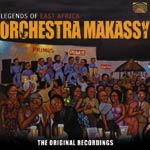 Orchestra Makassy: Legends of East Africa, ARC, 2004
Orchestra Makassy: Legends of East Africa, ARC, 2004
Despite video games, there are many reasons to be glad to be alive during the age of technology. One of the biggies is being able to travel through space and time to hear glorious sounds from the past and from other lands. Legends of East Africa is a prime example; in this case the musical pleasure is Tanzanian soukous/rumba circa 1982. Okay, that may not be all that long ago, but I would have missed it entirely if not for technology.
This was originally released as the album Agwaya, and a couple of extra tracks have been added. If the Makassy name doesnt ring a bell, the names of band members Mose Fan Fan and Remmy Ongala should. They and the rest of the group had learned their licks and earned their keep playing for dance clubs, so by the time they got around to recording, their musicianship was absolutely sparkling. This reproduction is very clear, very crisp (all except for the two bonus tracks at the end, which sound like monothe actual music, though, is as attractive as the rest of the disc).
As you can imagine, this is effervescent music, bouncy and full of the joy of life. There are four vocalists, two lead guitarists, two trumpets, two saxes, three drummers. Lyrics are in several African languages, some of them appearing (with English summaries) in the accompanying booklet; most recount the trials of daily life. One actually praises Comrade Robert Mugabe as Zimbabwe’s independence leader, which shows how long hes been around and how circumstances change.
Elegant instrumental solos emerge from jazzy song structures. Guitars dance, horns scintillate, rhythms percolate. It amazes me that the pace can be so quick, the flow so relentless, the sound so vibrant, yet somehow it all remains so effortless and relaxing. Maybe that’s just the magic of great music.
I haven’t even mentioned the appealing melodies or the stunning vocals or the multi-textured, multi-layered percussion. You’ll just have to travel through time and space for yourself. Go get this album and rejoice that technology has made it possible.
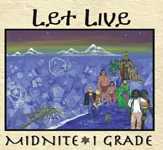 Midnite: Let Live, I Grade Records, 2005
Midnite: Let Live, I Grade Records, 2005
Half a minute into the first track and you KNOW this is not pop music. A steady reggae beat, but rudimentary. Minimalist melody. Intense, chanting vocal. Subdued arrangements. Nothing to seduce you with mere charm and decoration. The atmosphere is dark; the atmosphere is dread.
Thus the singular vision and original sound of Midnite continues with another chapter called Let Live. Its a chapter very much centered on the uniquely textured vocals and literate lyrics of Vaughn Benjamin. A master of understatement in his delivery if not his words, Benjamin holds forth on the Rasta faith, materialism, social injustice and more. Here’s a sample: intelligentsia who know not what they’re talking about; political misjudgements based upon projections of your paranoia and insanity. See?he feels strongly, and is keen on sharing, sometimes in such a rapid-fire delivery that I’m just not sure whats going on. No wonder the lyrics aren’t provided; they’d probably fill a thick book.
Okay, given that the music is a backdrop for the message to an even greater extent than usual in reggae, does that mean just token arrangements? No way. Producer Tippy Alfred has given all sorts of care and attention to what, after all, powers the words and renders them listenable.
Instrumentation includes nyahbinghi drums and a berimbau (combination one-stringed bow and shaker) along with the usual guitar, keyboard, drums and bass. But its the smart, judicious use of these various tones and textures, along with some overdubbed harmonies from Benjamin himself, that gives the deep grooves of this album their subtle variation and beauty.
I would never suggest that anything here is remotely breezy or light-hearted, but a few of the songs are somewhat tuneful, with tempo changes and other stylistic differences easing the intensity when necessary, including Pressure and Massiah guesting as a singer/deejay combo on the thoughtful All About What You Do.
So yes, some elements of Let Live come from the dancehall, and obviously the basic impetus remains Jamaica’s deep Rasta roots. Yet the bulk of Midnite’s artistry can be attributed only to the unique and sophisticated musical vision of the individuals involved. This album is further proof that the power of reggae has found a creative home in St. Croix.
Dub Trinity & Chet Singh: Dub Trinity & Chet Singh, 2004
What do we have here, a North American LKJ? Linton Kwesi Johnson without the sonorous voice but with the highly charged lyrics, highly developed social conscience, and rootical reggae band behind? Its an obvious comparison. Dub poet-deejay-singer-chanter Chet Singh is from Jamaica, but Dub Trinity is actually a dub duality from the Toronto area: Beau Dixon and Gregory Roy. Together they do their own updating of a grand Afro-Caribbean musical tradition, ultimately the same tradition that brought us the talking blues, and it shows.
It shows in the lyrics: angry, sardonic, sarcastic, satiric, biting, pointed, irreverent, derisive, even reflective – everything our old English teachers should have taught us poetry could be. As well as literate, of course. We need the critical, outspoken observers of society who can put their observations into music, the Bruce Cockburns, Billy Braggs, LKJs and Chet Singhs. With their strategically targeted enemies they can inflict a lot more verbal damage than any number of reggae/ragga firebrands who generally want to burn down Babylon.
My name is Joe Duplicity, Singh proclaims over quick drumming and steady rhythm guitar, I live in New York City; I watch the TV and I get confused Another track, Angels of Mercy, starts with a drum roll and the kind of easy flowing organ riff you’d hear in an old rocksteady instrumental, but the good feeling is interrupted: a special newsflash: ten Palestinians dead today, five Israelis dead today; a simple sing-song chorus repeats the death count. The juxtapositions of musical elements, as well as the lyrics themselves, deliver a strong statement.
Like LKJ, Singh often uses very specific circumstances and factual events to make his points; the specific becomes universal. Counter Attack is an example: its lyrics cover Canadian politics both federal and provincial in which names are named, but those lyrics also explore broader themes of interest to all earth dwellers: air and water pollution, the disparity of rich versus poor, the policies of the world bank. The reggae is likewise strong. Arrangements and rhythms differ from track to track, and dub elements abound – two of the nine tracks are pure dub, in fact.
The relaxed tempo and reflective mood of the last track stay with me: Twas another lazy Sunday/And I was sitting on the grass now/Watching the sun come and wondering/Why, why, why, in the abundance of water, plenty cups are empty Sometimes I wonder too. It seems a very natural thing that such musings should be set to a deep and potent reggae beat.
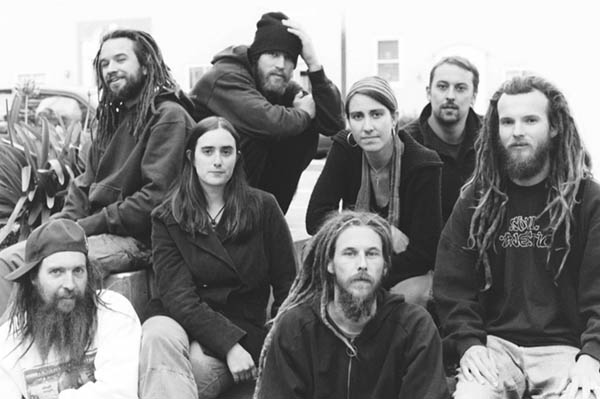 Soul Majestic: Until That Day, Soul Majestic Music, 2004
Soul Majestic: Until That Day, Soul Majestic Music, 2004
I used to be cussedly didactic. I always had the urge to teach a lesson. My attempts at writing were attempts at making the significant statement, every time. My editorial cartoons were often disguised sermons. But Im trying to lighten up. Now my urge to improve others is restricted to writing critiques, and since everyone knows critics have no actual influence, this is like a withdrawal for me. But I used to have the urge, and I had it bad.
Other people have the urge too. It seems almost inescapable in reggae, especially among the contemporary US reggae groups who pride themselves on their rootsiness. Long gone are the days of songs purely for fun. Now there always has to be a message. Everyone wants to be seen as credible, so no smiling please.
I shouldn’t pick on one single group, but I will. Witness the following track by track rundown of Soul Majestic’s Until That Day:
1) entitled Hypocrisy; about oppression, suffering, revolution.
2) a love song, but with a message: Oh my lady, oh my queen, we both have grown.
3) about living itally and happily, though in poverty.
4) Even when the world goes wrong, my mind is holding firm.
5) about music, but notice that its good for you: This here music gonna rock you to a higher plane.
6) Stand up, find the strength inside/When life gets rough, you cant run and hide.
7) A race with no knowledge of their past culture/Is like a tree without the roots.
8) To those who came before us/We give thanks for the wisdom you pass.
9) an ode to herb, but notice that its good for you: A more perfect medicine would be difficult to find.
10) a hymn to Jah: We all are here to do thy works, thy will, that’s my true ambition.
11) entitled Be Wise.
12) and in case you missed everything in the earlier tracks: Make a change, set a goal, improve your soul, rid the world of greed
13) dub of #1.
14) dub of #7.
15) dub of # 8.
Until That Day is an accomplished work. The vocals are great, the musicianship is topnotch, the tunes are tuneful, the band is proficient in the various styles represented (dancehall included). Its quite enjoyable. But if we are to take our clues from Soul Majestic themselves, obviously those considerations aren’t the important ones. The only question that really matters is this: Is Until That Day good for you? If it lightened up a bit, it certainly would be.
 Anna Fisher and Jawge Hughes: Yin Yang, Molin Music, 2004
Anna Fisher and Jawge Hughes: Yin Yang, Molin Music, 2004
The oboe doesn’t show up a lot in reggae. Other classical instruments do, but they’re of the brass, stringed or keyboard persuasions. Woodwinds, umm, not so much. Anna Fisher wants to set right that little omission, and who can blame her? My memories of the oboe go back to my teenage years when my kid brother squeaked and squawked his way from novelty to reasonable proficiency. After we got beyond the first few months I came to love the richness of the oboes tone. And now here it is hooked up with reggae’s immutable rhythms, and not a squeak or squawk to be found. Nice. The oboes close cousin, the English horn, shows up too.
Fishers love for her main instrument is obvious, but by the end of the album we can see clearly that I Can See Clearly Now is another great love. Yes, the old hit by Johnny Nash is given four treatments: an oboe instrumental, an English vocal version, a Spanish vocal version, and a dub. Were lucky that the tune is strong enough to withstand such an onslaught of music making, which it does, although you may find yourself wishing for Nash’s beautiful voice instead of Fishers barely serviceable one.
Lovely as that song is, however, my favorite track on this mostly instrumental disk is Jawge Hughes Jamaica, an airy introspection with a gorgeous melody line over a solid, relaxing one-drop rhythm. Its here that the oboes capacity for musical expression and subtlety are most obvious.
Besides writing five good tunes, Hughes does considerably more to justify his name on the cover. He adds his voice here and there, but primarily hes the keyboardist and programmer. I looked in the liner notes to see who plays the beautifully understated pan on I Can See, but to no avail, so I have to conclude that he is responsible, and that the pan is synthesized. Hey, it works. Various other musicians also contribute sounds and textures, including Tony Chin on guitar, The Fully Fullwood Band (briefly); and Marcia Higgs delivering a rushed, lively vocal on her effervescent song Hip Hop Hooray Oh!
Yin Yang is a friendly album. You just have to get beyond the crummy packaging (poor photos and meager information) to the pleasant music inside. It may offer a revelation to some listeners: that reggae is more adaptable than we often realize, and can thrive in different forms. Im glad that at least one of them has room for the oboe.
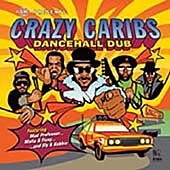 Crazy Caribs: Dancehall Dub, Ariwa/RAS, 2004
Crazy Caribs: Dancehall Dub, Ariwa/RAS, 2004
Its almost deserving of a newspaper headline: Daring Dub Disc Descends into Dancehall. Subhead: Crazy Caribs incorporate dub tradition into ripe musical genre. Lead paragraph: In a long overdue venture, the Crazy Caribs have released a full-scale compact disc that brings the sound-altering studio manipulation known as dub into the energetic world of dancehall reggae. Featuring such popular musical figures Fluxy, Sly and Robbie, and produced by studio whiz Mad Professor, the new album
And so it would go, this big news item. If only the actual music were as electrifying as the news.
As you would expect from the names involved, it is expertly crafted dub. Sounds swirl, chime, echo and percolate over clacking beats and inventive percussion. Pleasant tunes remain discernable despite the dubbing process. There’s even a sound appearing in the final track reminiscent of Lee Perry’s famous mooing cow (roaring lion, whatever).
So its a nice idea, reasonably well executed. It just doesn’t come across as the inventive departure from dubs norms that one would expect. The absence of vocals – the total and absolute absence is maybe the biggest reason for it to be lower than expected on the excitement meter. The steel pan, courtesy of someone called Pan Africanist, provides a welcome and fresh musical texture, but is no substitute for the human voice.
However, however, however. It is danceable (I tried it out in the privacy of my own home) and it is highly listenable. So what if its not earth-shakingly adventurous?
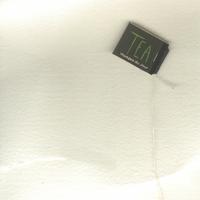 Tea: Voyages du Jour, Lost Grove Records, 2004
Tea: Voyages du Jour, Lost Grove Records, 2004
Given that were talking tea, its tempting to use words like tasty and tasteful, which the album often is and always is, respectively, but at times the word tepid seems to fit better.
But that doesnt tell you much about what the music sounds like. Well, look at the artwork. The front photo shows the paper tab that attaches by a string to the teabag that appears on the back cover. Clever, sophisticated, intellectually appealing. The music corresponds: suave, perfectly executed and ultra professional, with sky-high production values.
Ill be more specific. Its Afro-French pop music, meaning dance music. If to you that connotes superficiality, well, thats one way to look at it. The rhythms are complex and many of the tunes are almost pretty, with generic, seemingly dja-heard melodies. Several notable world music guests contribute vocals. The arrangements arent exactly inspired, but the grooves are deep, the horn charts are fully developed, the feminine voices in the background are ethereal. The bass bubbles, the piano tinkles. It has limpid flute, sensitive acoustic guitar, expressive electric guitar, synthesized texturesspecific enough yet?
I quite like the song entitled Al Hajii Yoo. Its vocal is more soulful than most, the tune more memorable, the sound rich and pleasurable. Just as good is the closing track, Baba. Congolese vocalist Steve Ngondo sings in Lingala with minimal accompaniment; then a percussive riff carries us into a more substantial segment, where a bouncy beat supports the lively music-making on topin fact I can picture the musicians actually moving as they play (which I had a hard time imagining through most of this album). The song has several additional changes, one of which brings the female chorus up front for a while. Kinda nice.
Its too bad the good stuff has to make room so often for the fluff stuff: beats that become relentlessly automatic, production so perfect that it sometimes disengages completely from the messy world of reality. But in truth, Teas Voyages du Jour is very accomplished, very professional. I know that. When it ended last time, I dug out my old vinyl copy of The Kinks Muswell Hillbillies and played the deliciously sloppy romp called Have a Cuppa Tea. How refreshing it was.
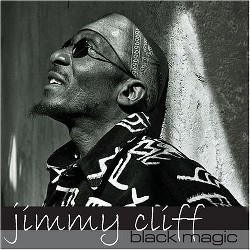 Jimmy Cliff: Black Magic, Artemis Records, 2004
Jimmy Cliff: Black Magic, Artemis Records, 2004
– Youve listened a few times. Whaddya think?
– Hey, its getting a lot of attention for a reggae album. Reviews all over the place, not just in specialty mags and papersmass consumer ones too. Cliff is huge right now.
– Apparently a lot of people like the album. What do you think of it?
– People say its the best hes done in years. Mostly new songs, lots of guest stars, big production.
– So you like it, then? The production? The arrangements?
– Theres a string orchestra in there, a gospel choir, some rapping and scratching, a bit of Spanish, all sorts of different stuff. The credits go on and on, three pages worth of small print in the liner notes. Organ, trombone, calypso pan, you name it. There must be a half-dozen credits for programming and another half dozen for remixes. This was one huge project to put together.
– But do you like it? Do you think it all works?
– Its remarkable, really. So many people. Including big non-reggae stars like Annie Lennox, Sting, Wyclef, Kool & The Gang. Those names contribute a lot.
– So you think those folks contribute something worthwhile?
– I meant the names themselves. Greater name recognition, better promotion. Marketing, you know?
– Some of those folks helped compose the songs. Do you like them?
– Over half of the 16 songs have joint writing credits. That has to reflect a songwriter with a wealth of ideas. Or not enough.
– But having additional writers means the content is varied. You must like that, huh?
– Wow, variety. Electronic stuff, dancehall rhythms galore, a relationship tune, a plea to get together and show our power all over the world. Tony Rebel shows up. Bounty Killer. Plastic gets used as a metaphor for cheap and artificialimagine! Cliff does some gorgeous singing on Love Comes.
– Ahh yes, hes still got that voice you like, right?
– Love Comes reminds me of his singing on Bongo Man years ago, which for some reason I want to go listen to instead, and which coincidently doesnt include a rap. The City is a listing of city names, a clich come to lifeyou know, that someone has such a beautiful voice he could get away with singing the telephone book. Terror informs us that 9/11 was a wakeup call to nations great and small. War in Jerusalem updates Max Romeos War Ina Babylon. The best song on the album is about the plight of refugees in wartime; Im not sure its reggae, but Joe Strummer was involved.
– You like Over The Border, then. But do you like the album as a whole?
– I should like it. I want to like it. Theres lots to appreciate.
– DO YOU LIKE THE ALBUM?
– Gotta run.






